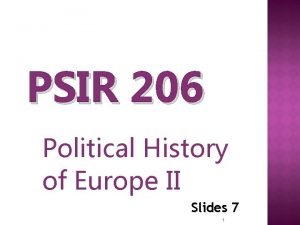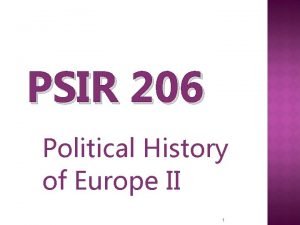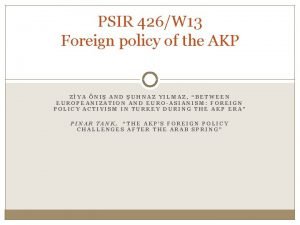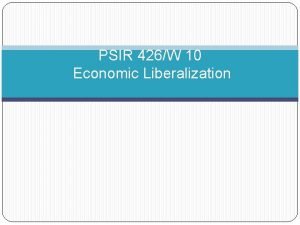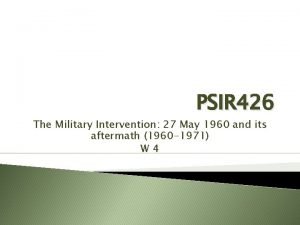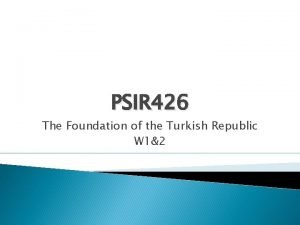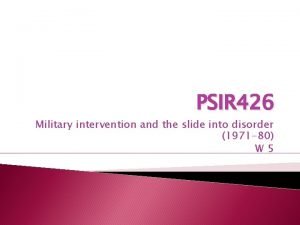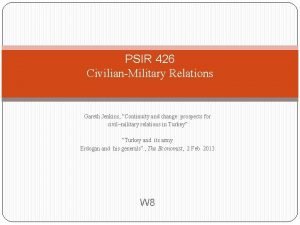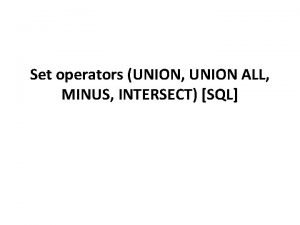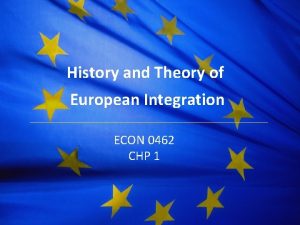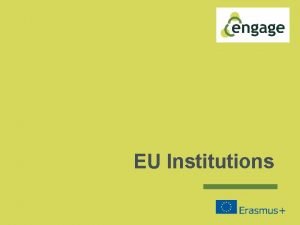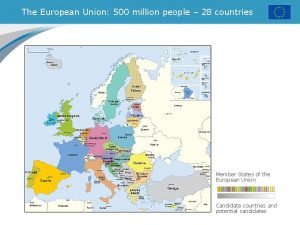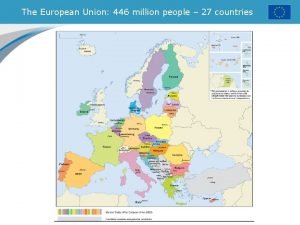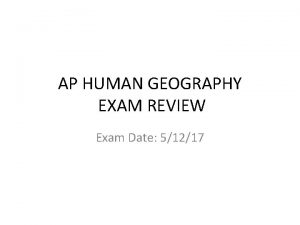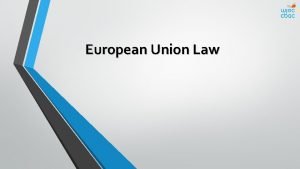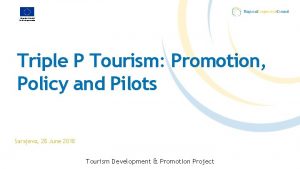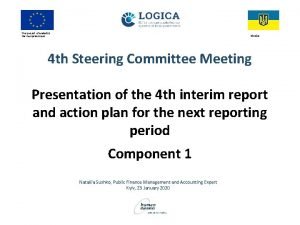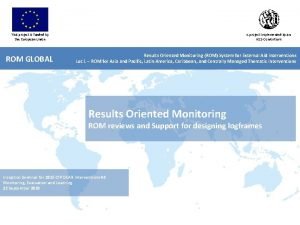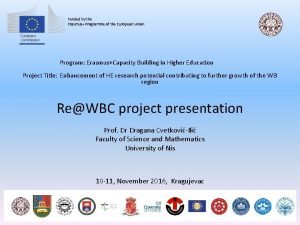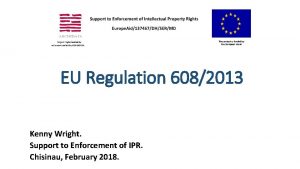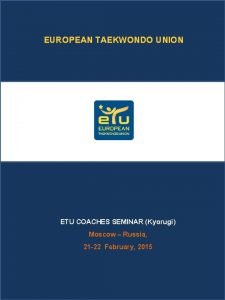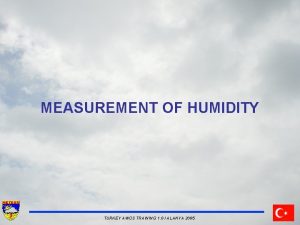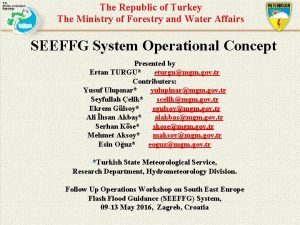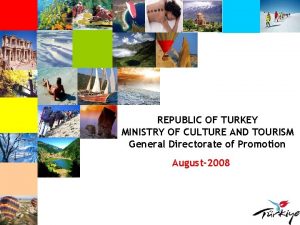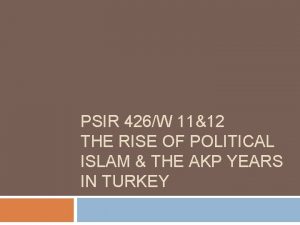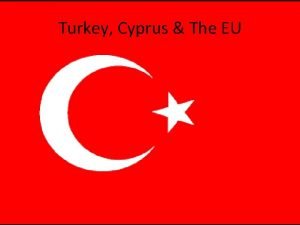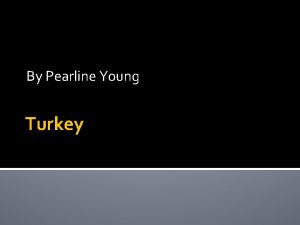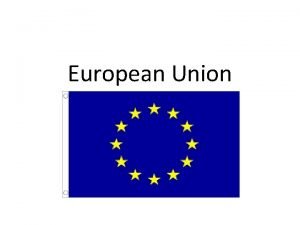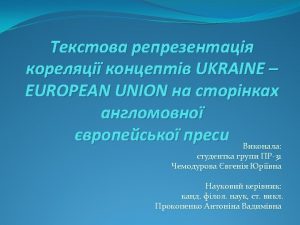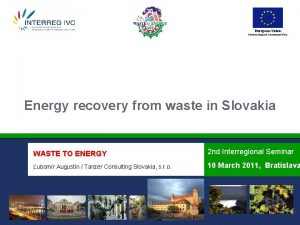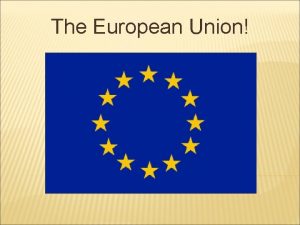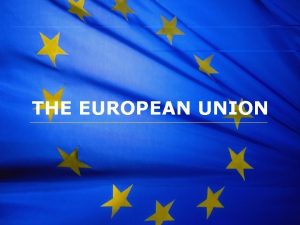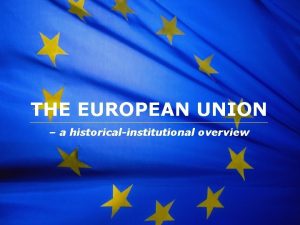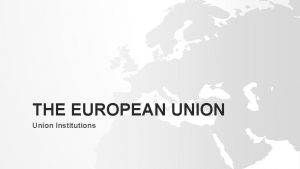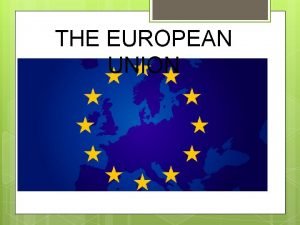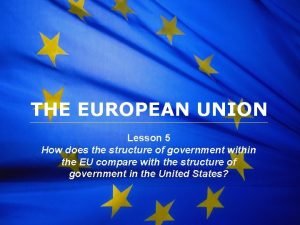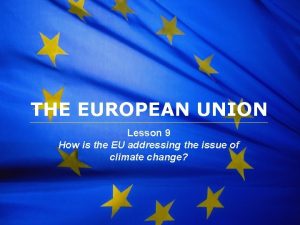Turkey and the European Union PSIR 426W 14

































- Slides: 33

Turkey and the European Union PSIR 426/W 14 Marcie J. Patton, , “AKP Reform Fatigue in Turkey: What has happened to the EU Process? ”, Mediterranean Politics V. 12, Issue 3, 2007 Kursat Ertugrul, “AKP’s Neo-Conservatism and Politics of Otherness in Europe– Turkey Relations. ” New Perspectives on Turkey, No. 46, 2012, 157– 186.

Turkey and the European Union �The AKP government campaigned in favour of Turkish membership in the European Union and upon taking office passed an impressive battery of EU-demanded democratic reform measures. �Yet after the government was formally given a date to open accession talks it evidenced a surprising retreat from this political agenda. �Why?

Turkey and the European Union �Following the 2002 general election in Turkey, the government ran through parliament a succession of required EU political reforms. �Unexpectedly, the reform momentum began to decelerate following the 17 December 2004 Brussels summit at which the European Council praised the steps taken, and determined that Turkey had complied ‘sufficiently’ with the Copenhagen political criteria so that the accession process could officially begin in the autumn.

Turkey and the European Union �As 3 October 2005 – the date set by the EU to formally launch accession negotiations – drew closer, the ruling party increasingly displayed signs of ‘reform fatigue’, hesitating to push hard for implementation and enforcement of the rights-based reforms that it had so assertively legislated.

Turkey and the European Union �How can we see the signs of this ‘reform fatigue’? �the excessive force used by the police to break up a peaceful demonstration marking International Women’s Day in March 2005, whose actions Prime Minister Erdogan defended claiming that the women had provoked the violence.

Turkey and the European Union �The new penal code adopted in June 2005 not only fell short of effectively protecting women’s rights particularly with respect to honour killings and virginity testing, but it also stiffened penalties for the expression of non-violent opinions deemed to insult the nation or harm national interests.

Turkey and the European Union �Yearly EU progress reports persist in reminding Turkey that much remains to be done, and that the reform process must incorporate adoption plus implementation.

Turkey and the European Union �After taking on executive leadership of the EU project, why did the AKP’s enthusiasm for reform wane? �In the period after 17 December 2004, the AKP was put on the defensive, trapped between the EU’s failure to act reassuringly and nationalist repercussions at home (AKP, together with liberal intellectuals and civil society organizations such as TÜSİAD became an explicit supporter of the EU membership process).

Turkey and the European Union �After announcing that accession talks could formally begin the EU sent mixed signals, extending in one hand the carrot of accession talks and waving a stick in the other hand warning that negotiations could be suspended at any time.

Turkey and the European Union �Far from being a time for self-congratulation, the period after 17 December turned into a political minefield for the AKP government. �EU modalities spurred a rise in anti-EU sentiments and an upsurge of ultranationalism which helped drive calls for early elections.

Turkey and the European Union �Whereas the popularity of EU membership had given the AKP a superior edge in electability at the beginning of its term in power, two years later mixed signals sent by the EU and a nationalist backlash threatened to erode the government’s majority control of parliament at the next general election. �Early election fever helped put the brakes on the government’s reformist zeal.

Turkey and the European Union �After the Brussels summit, the modalities of interactions between the EU and Turkey changed as expectations altered. �Europeans had to digest the reality that the borders of Europe could expand to incorporate a Muslim country and Turks had to adjust to the fact that the invitation came with strings attached.

Turkey and the European Union �Despite the conviction that the country’s future lies in Europe, the Turkish public was rapidly convinced by the media that their country was being treated differently from other candidate countries. �Diplomatic wrangling in the run-up to 3 October 2005 (the date set to formally launch accession talks) added to mounting evidence that Europeans appeared to be undergoing a sea change of attitude towards Turkey.

Turkey and the European Union �Days before the signing, Austria demanded that the EU consider a ‘privileged partnership status’ for Turkey instead of opening entry talks, and although this was rejected after a weekend of intense meetings among European foreign ministers, the episode served as a stinging reminder that accession negotiations were considered an open ended process with the outcome not guaranteed in advance.

Turkey and the European Union �EU finger shaking, negative criticisms have generated feelings of humiliation on the part of Turkish people. �Nationalist hard-liners have been quick to turn this feeling to their advantage, placing the spotlight of blame on the AKP for its government’s pro-EU policies.

Turkey and the European Union �The affronts that have stirred up the most resentment are, first, � that the EU holds itself apart as a Christian Club; �second, that the EU process is a one-way street; and, �third, that the EU operates a double standard vis-a`-vis Turkey.

Turkey and the European Union �The belief that EU membership is reserved for Christian countries has become increasingly prevalent among Turks, and has grown surprisingly among those least expected. �In December 2005 the English language Turkish Daily News polled its Internet readers ‘What is the EU? ’ and 46. 9 per cent clicked the box that it was a Christian club.

Turkey and the European Union �A nationalist backlash is widely acknowledged in Turkey and public opinion has registered a significant decline in support for EU membership. �European pressure to settle the Cyprus problem, to extend cultural rights to Kurds, and to recognize the deaths of Ottoman Armenians during World War I as genocide top the list of issues that have influenced a wave of reactionary nationalism.

Turkey and the European Union �Anti-EU Kemalist elites entrenched in three key state institutions, the judiciary, the Turkish Higher Education Board (YOK), and the military have thwarted, contested and/or circumvented institutional restructuring and thrown up obstacles to implementation of democratizing reforms. �Those elites and the institutions they control are the keepers of the secular national Kemalist flame within the state and view the AKP with distrust, regularly accusing it of Islamic dissimulation.

Turkey and the European Union � Although the Turkish military still retains a reservoir of legitimacy as the most trusted institution in the country, it has been and remains the most powerful stumbling block to remedying Turkey’s democratic deficit. � The military is the institution most strongly associated with antipathy towards the AKP, first because of its self-ascribed, historically determined role as guardian of authoritarian secularism, and second because under the auspices of the 28 February process it made defence of secularism its top security concern.

Turkey and the European Union �The military’s anxieties about the party’s roots in political Islam put it at immediate loggerheads with the AKP government’s pursuit of the EU rights-based reforms fearing that broadening the space for identity politics would encourage not only rising fundamentalism but also Kurdish separatism. �Whereas the AKP government has framed political Islam and the Kurdish question as domestic issues that should be addressed with policies of greater democracy, the military has classified both as national security threats.

Kürşad Ertugrul, AKP ' s neo-conservatism and politics of otherness in Europe-Turkey relations �This article argues that the AKP constitutes a domestic-foreign policy nexus of change characterized by a neo-conservative "style of thought" that aims to redefine the identity of Turkey.

Kürşad Ertugrul, AKP ' s neo-conservatism and politics of otherness in Europe-Turkey relations �The politico-cultural strategy of the AKP in pursuing the goal of membership to the European Union exhibits this identity politics. I define this politico-cultural strategy as politics of otherness.

Kürşad Ertugrul, AKP ' s neo-conservatism and politics of otherness in Europe-Turkey relations �“It is my contention that the AKP as a political agent is the bearer of a "style of thought" and "world-view design” that is dominantly characterized by neo-conservative ideas. This is not to deny reformist, flexible, and catch-all sides of AKP politics. However, the point here is that "the world" that the AKP at the level of ideas aims to construct has its ideological sources dominantly in neo-conservatism”.

Kürşad Ertugrul, AKP ' s neo-conservatism and politics of otherness in Europe-Turkey relations �The AKP is the bearer of a neo-conservative worldview, and its agency is about objectifying this design through and in a domestic-foreign policy nexus. �The AKP's ideology has affirmed the Islamic. Oriental otherness of Turkey in European imagery and challenged the peripheral position accorded to it in an ambitious foreign policy vision aspiring to regional leadership and a capacity for global impact.

Kürşad Ertugrul, AKP ' s neo-conservatism and politics of otherness in Europe-Turkey relations �According to the author, AKP has allegiance to the American version of neo-conservative ideology as understood and interpreted by the ideologues of the AKP. � It is within this ideological form that the AKP is trying to reconstitute Turkish political, economic, social and cultural life.

Kürşad Ertugrul, AKP ' s neo-conservatism and politics of otherness in Europe-Turkey relations �AK Parti ve Muhafazakar Demokrasi (AKP and Conservative Democracy), written by Yalçın Akdoğan, the principal political advisor to Erdoğan: �“The AKP considers the reflections of emotions and thoughts emanating from religion to politics as normal and sociological; yet, it emphasizes that political activity using religion, making religion an instrument, and exclusive political practice in the name of religion are wrong”.

Kürşad Ertugrul, AKP ' s neo-conservatism and politics of otherness in Europe-Turkey relations �Ertugrul’s review of the basic text of the AKP s ideology clearly shows that the AKP is trying to reinterpret the basic tenets of neoconservatism, particularly of American neoconservatism, in the context of Turkish politics.

Kürşad Ertugrul, AKP ' s neo-conservatism and politics of otherness in Europe-Turkey relations � For the AKP, the basic argument of American neoconservatism is crucial. That is, economic and social modernity (capitalism as a system of socio-economic relations and the bourgeois order) needs to be embedded in the traditional and religious values and morality of society to reproduce and legitimize itself. � In other words, cultural modernity, as the experience of an open-ended creation of new forms of subjectivity and challenging forms of artistic expression, and a dissident counterculture are to be rejected. In this ideology, the state or the political power is attributed a significant role in sustaining this incorporation of socioeconomic modernity by traditional and religious values and morality.

Kürşad Ertugrul, AKP ' s neo-conservatism and politics of otherness in Europe-Turkey relations �As has been emphasized, one of the reasons why the AKP adopts neo but not traditional conservatism is because neo-conservatism does not reject modernity and progress for the sake of preserving the old. �The compromise with modernity, progress and change is indeed a distinctive characteristic of neo-conservatism.

Kürşad Ertugrul, AKP ' s neo-conservatism and politics of otherness in Europe-Turkey relations �Yet, this future-oriented conservatism projects ideals as derived from the past. �While these ideals are "the foundational principles of the Republic" in the American neo-conservatism, the AKP turns back to the Ottoman Empire in projecting its vision of Turkey's future in terms of its identity and interests.

Kürşad Ertugrul, AKP ' s neo-conservatism and politics of otherness in Europe-Turkey relations �For example, the AKPdefines Turkish society and culture as neither “European” nor “Western. ” On the contrary, a “civilizational” and “cultural” identity associated with religious values and traditions is attributed to Turkish society and culture.

Kürşad Ertugrul, AKP ' s neo-conservatism and politics of otherness in Europe-Turkey relations �Turkey’s civilizational and cultural identity is argued to be the Ottoman heritage, characterized by its role to represent Islamic/Eastern civilization against Christian/Western Civilization. � As Ertugrul underlines, this historical heritage and the corresponding cultural/civilizational identity is “fixed” or “given. ” No doubt “this is a highly essentialist conception of Turkey’s identity and interests”.
 Psir 206
Psir 206 Psir 206
Psir 206 Psir 426
Psir 426 Psir 426
Psir 426 Gareth jenkins turkey
Gareth jenkins turkey Psir 426
Psir 426 Psir 426
Psir 426 Psir 426
Psir 426 Psir 426
Psir 426 Union union all intersect
Union union all intersect European union history
European union history European union institutions explained
European union institutions explained Co-funded by the erasmus+ programme of the european union
Co-funded by the erasmus+ programme of the european union Co-funded by the erasmus+ programme of the european union
Co-funded by the erasmus+ programme of the european union European union 28 countries
European union 28 countries European union 28 countries
European union 28 countries European union military
European union military Primate city definition ap human geography
Primate city definition ap human geography Https://europa.eu/european-union/index_en
Https://europa.eu/european-union/index_en This project is funded by the european union
This project is funded by the european union This project is funded by the european union
This project is funded by the european union This project is funded by the european union
This project is funded by the european union This project is funded by the european union
This project is funded by the european union This project is funded by the european union
This project is funded by the european union This project is co-funded by the european union
This project is co-funded by the european union Co-funded by the erasmus+ programme of the european union
Co-funded by the erasmus+ programme of the european union This project is funded by the european union
This project is funded by the european union European taekwondo union
European taekwondo union Eureka eurostars eligibility
Eureka eurostars eligibility Compare and contrast israel saudi arabia and turkey
Compare and contrast israel saudi arabia and turkey Humidity monitor turkey
Humidity monitor turkey Voeem
Voeem Eturgu
Eturgu Republic of turkey ministry of culture and tourism
Republic of turkey ministry of culture and tourism
